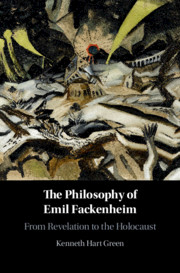Book contents
- The Philosophy of Emil Fackenheim
- The Philosophy of Emil Fackenheim
- Copyright page
- Dedication
- Epigraph
- Contents
- Acknowledgments
- Abbreviations
- Introduction The Unending Struggle with Revelation in the Thought of Emil Fackenheim
- 1 What Is Faith?
- 2 Individual versus Collective, Rational versus Mystical
- 3 Revelation as a Possibility
- 4 On Authority, Tradition, and History
- 5 Divine Power versus Human Freedom
- 6 From Presence to History
- 7 Confronting Radical Evil as Rupture
- 8 Diabolical Revelation and the Holocaust
- 9 Negative Absolute and Fragmentary Transcendence
- Conclusion Revelation of the Diabolical Truth in History
- Bibliography
- Index
8 - Diabolical Revelation and the Holocaust
Published online by Cambridge University Press: 06 October 2020
- The Philosophy of Emil Fackenheim
- The Philosophy of Emil Fackenheim
- Copyright page
- Dedication
- Epigraph
- Contents
- Acknowledgments
- Abbreviations
- Introduction The Unending Struggle with Revelation in the Thought of Emil Fackenheim
- 1 What Is Faith?
- 2 Individual versus Collective, Rational versus Mystical
- 3 Revelation as a Possibility
- 4 On Authority, Tradition, and History
- 5 Divine Power versus Human Freedom
- 6 From Presence to History
- 7 Confronting Radical Evil as Rupture
- 8 Diabolical Revelation and the Holocaust
- 9 Negative Absolute and Fragmentary Transcendence
- Conclusion Revelation of the Diabolical Truth in History
- Bibliography
- Index
Summary
Toward the end of his career, Fackenheim is forced reluctantly to conclude that revelation has almost completely ceased to be a present possibility. Reluctantly, for he began his career arguing that Judaism makes no sense without revelation, and he labored for decades seeking contemporary revelation before he is forced to acknowledge that there is no longer any immediate access to revelation. He concludes that if revelation can be said to have occurred at all in our era, it occurred on the negative, rather than positive, level of being, by revealing a radical absence of the divine in history, especially in the present era. He sees this as a “negative revelation,” far more radical than Buber’s mere “eclipse” of God, which Fackenheim thinks is far too weak a metaphor for the force and impact of God’s seemingly total absence during the Holocaust, revealing that He may no longer be the God Who saves in history.
- Type
- Chapter
- Information
- The Philosophy of Emil FackenheimFrom Revelation to the Holocaust, pp. 269 - 317Publisher: Cambridge University PressPrint publication year: 2020



